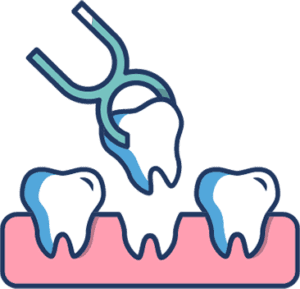Your medical adviser
Xavier Bourquin

Contact me on whatsapp directly
[ht-ctc-chat]

Oral surgery refers to any surgical procedure performed in or around the mouth and jaw, incl. tooth extraction, wisdom tooth extraction, treatment of tooth cysts, as well as periodontal surgery and removal of tumors.
Tooth extraction is performed by a dentist or oral surgeon and is a relatively quick outpatient procedure with either local, general, intravenous anesthesia, or a combination. Removing visible teeth is a simple extraction. Teeth that are broken, below the surface, or impacted require a more involved procedure.
Extraction of wisdom teeth
Root canal removal
Placement of bone material and bone regeneration
Placement of dental implants by the methods of dental implantation
Maxillo facial surgery
Treatment of the jaw after trauma or injury
Before scheduling the procedure, your dentist will take an X-ray of your tooth. Be sure to tell your dentist about any medications you take, as well as vitamins, supplements, and over-the-counter drugs.
Tell your dentist if you will soon be treated for another medical condition with an intravenous drug called a bisphosphonate. If so, the extraction should be done before the drug treatment, or your jaw could be at risk for osteonecrosis (bone death).
Also, tell your dentist about any of the following conditions:
Your dentist may want to make sure all conditions are stable or treated before you undergo the tooth extraction. You might be prescribed antibiotics in the days leading up to the procedure if:
It’s helpful to keep the following in mind for the day of the tooth extraction in order to ensure quality treatment:
Your tooth extraction will either be simple or surgical, depending on whether your tooth is visible or impacted.
You will receive a local anesthetic, which numbs the area around your tooth so you’ll feel only pressure, not pain, during the procedure. The dentist then uses an instrument called an elevator to loosen the tooth and forceps to remove it.
You will likely receive both local anesthesia and intravenous anesthesia, the latter of which makes you calm and relaxed. You may also receive general anesthesia, depending on any medical conditions. With general anesthesia, you will remain unconscious during the procedure.
The general dentist or oral surgeon will cut into your gum with a small incision. They may need to remove bone around your tooth or cut your tooth before it can be extracted.
The cost for tooth extraction varies widely depending on whether the tooth is impacted. Simple extraction usually costs between 40 – 60 euros per tooth, and may be more depending on the type of anesthesia you need.
200 – 400 euros per tooth for a surgical extraction to remove impacted teeth is significantly higher.
It normally takes a few days to recover after a tooth extraction. The following steps help ensure that your recovery goes smoothly.
Xavier Bourquin

Contact me on whatsapp directly